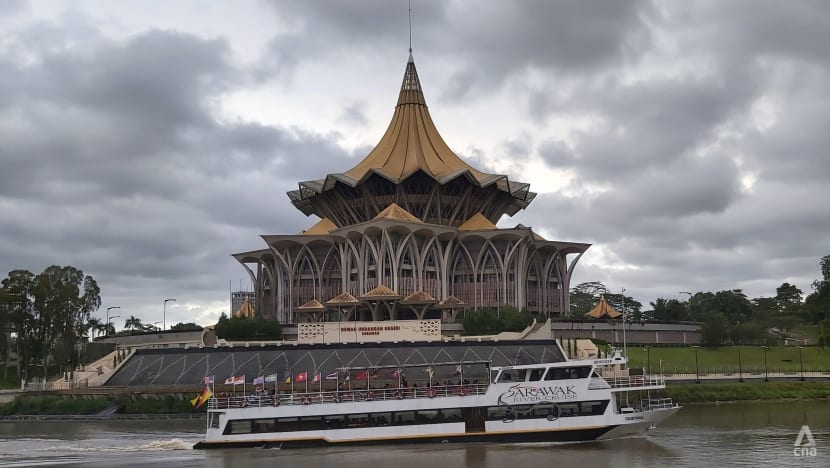Analysis: How Sarawak manages to pass two landmark laws in Malaysia, even ahead of the federal government
The eastern state is the first in Malaysia to establish an ombudsman and the first too to pass legislation addressing climate change.

The Sarawak state legislature building located along the Kuching river. (Photo: CNA/Rashvinjeet S Bedi)

This audio is generated by an AI tool.
SINGAPORE: Malaysia’s eastern state of Sarawak on Monday (Nov 20) passed two landmark laws in the country, namely the Sarawak Ombudsman Bill 2023 and the Environment (Reduction of Greenhouse Gases Emission) Bill.
With these two Bills, Sarawak has become the first Malaysian state to establish an ombudsman and the first to pass legislation addressing climate change, achieving both ahead of what the federal government tried but failed to do.
Analysts say that among the reasons why Sarawak was able to push through such laws, unlike in other states, is because it has not been too concerned with other issues in the religious or racial realm.
“Sarawak is the only state in Malaysia that has managed to keep its secular identity thus far.
“As a result, it is free to concentrate on other priority areas without being bogged down by racial and religious issues as in Peninsular Malaysia,” Dr Arnold Puyok, a senior lecturer in politics and government studies at the University of Malaysia, Sarawak (UNIMAS), told CNA.
SARAWAK’S LANDMARK BILLS
On Monday, state Deputy Premier Awang Tengah Ali Hasan said that the Sarawak Ombudsman Bill 2023 will enhance transparency and accountability in government agencies by allowing the public an avenue to report instances of mal-administration, according to the Malay Mail.
“This is a clear manifestation of our commitment to maintain integrity and ensure that state public service agencies would always provide high-quality services to the people,” Mr Awang Tengah reportedly said during a second reading of the Bill.
The Sarawak Ombudsman will be led by a Chief Ombudsman and a Deputy Chief Ombudsman, along with three to five other ombudsmen, he added.
Meanwhile, on the federal level, the Ombudsman Malaysia 2023 Bill, which has been in the works since 2019, has yet to be tabled in parliament.
The idea was first mooted by the then-Pakatan Harapan (PH) government under the leadership of then-premier Dr Mahathir Mohamad.
According to local media on Oct 10, the draft of the federal government’s Bill has been prepared and is in the process of improvement before being submitted to the Attorney-General’s Chambers and subsequently tabled in parliament.
Separately, during the presentation of the landmark Environment (Reduction of Greenhouse Gases Emission) Bill on Monday, Sarawak’s Deputy Minister in the Premier's Department Sharifah Hasidah Sayeed Aman Ghazali noted that Malaysia’s parliament has yet to pass any laws addressing climate change.
This is despite Malaysia’s commitment to reduce greenhouse gas emissions by 45 per cent by 2030 and to achieve carbon neutrality by 2050 in accordance with the Paris Agreement, said Ms Sharifah.
“Therefore, the (Sarawak) state government is taking the initiative to introduce this Bill," she was quoted as saying by The Star.
Ms Sharifah explained that among the measures listed in the Bill include a carbon levy which will be imposed on registered businesses that fail to reduce their carbon emissions to the set threshold.
"This Bill will also pave the way for Sarawak to have its own complete regulatory framework on clean and renewable energy, underlining our status as one of the global clean energy leaders," she reportedly said.
On the federal level, Malaysia’s national climate change Bill is expected to take another two to three years to develop, according to the Malay Mail quoting remarks by Malaysia’s Natural Resources, Environment and Climate Change Minister Nik Nazmi Nik Ahmad earlier this year in parliament.
He told the house on Feb 23 that the ministry is in the early stages of developing the Bill and will need a whole-of-nation approach which includes engaging with relevant stakeholders.
In addition to the two Bills passed on Monday, Sarawak has previously accomplished various other firsts in Malaysia, including testing the world’s first hydrogen-powered smart tram and also holding Malaysia’s first training ground for doctors and nurses specialising in palliative care, according to local media.
The neighbouring Bornean state of Sabah has also had its fair share of firsts.
In 2015, Sabah was the first in the world to pilot a jurisdictional certification approach to sustainable palm oil, reported Mongabay. According to local media, Sabah is also expected to hold Malaysia’s first tier 4 - or highest standard - data centre.
OTHER STATES UNLIKELY TO MIMIC SARAWAK: ANALYSTS
Analysts whom CNA spoke to said that other Malaysian states are unlikely to follow in Sarawak’s footsteps in pushing through contentious or politically sensitive legislation anytime soon due to various factors including a greater prioritisation of racial and religious issues in these states.
UNIMAS’ Dr Puyok told CNA that Sarawak, unlike the other states in the peninsular, “is different as it is a multiracial and multireligious state” and is thus not preoccupied with racial and religious issues.
Echoing this, Dr Oh Ei Sun, a senior fellow with the Singapore Institute of International Affairs, commented that other states, particularly those led by the opposition coalition Perikatan Nasional (PN), have other issues to focus on.
“Other states typically follow the federal government’s lead. And the PN states are concerned with religious rather than socioeconomic enactments," said Dr Oh.
The opposition PN currently leads four out of 13 Malaysian states, namely Perlis, Kedah, Kelantan and Terengganu.
Dr Oh also noted that the “daringness” of Sarawak chief minister Abang Johari Openg was needed for the passing of the two landmark Bills.
“The chief minister is apparently quite daring, a trait which he did not exhibit before he (took on his role),” noted Dr Oh.
Mr Abang Johari assumed the position of Sarawak chief minister in 2017.
Prior to this, from 2016 to 2017, he was the state deputy chief minister and concurrently helmed Sarawak’s Tourism, Arts and Culture ministry as well as the Housing and Urbanisation ministry, both of which he had previously led during his political career. He was also the state Minister of Industrial Development from 1987 to 2000.
Dr Oh said that Mr Abang Johari’s boldness could be attributed to the need to garner support amid a decline in the state’s resources.
“As Sarawak’s traditional resources such as timber that have kept the state afloat are going downhill, a new narrative is needed to persuade people to support him,” he told CNA.
Noting a positive outlook for Sarawak, Dr Puyok commented that the state is making headway toward its development through the implementation of progressive measures.
“Sarawak will push for more pro-business and tech-focused policies without waiting for approval from the federal government, given its desire for greater autonomy,” he said.
Separately, he told CNA that the neighbouring state of Sabah is attempting to emulate Sarawak but is failing to do so, particularly as its politics is susceptible to federal interference.
He noted that unlike in Sarawak, national parties remain relevant in Sabah and can affect local politics.
Sabah Bersatu and Sabah UMNO continue to have substantial grassroots support throughout Sabah, he added.


















